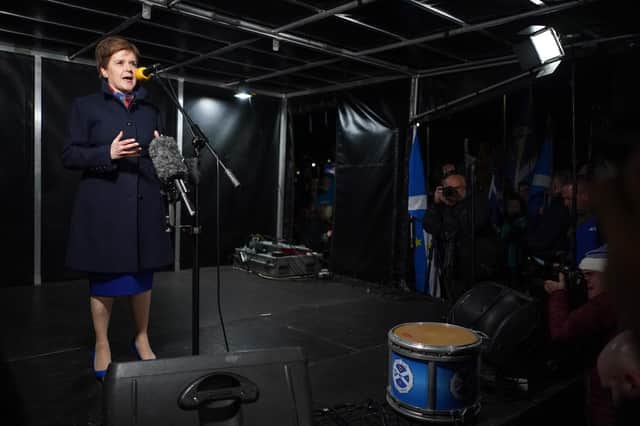Scottish independence referendum: Nicola Sturgeon's democracy denier jibe just adds to the poisonous nature of political debate – John McLellan


Prominent on our TV screens recently thanks to his campsite confrontations with this year’s panto villain Matt Hancock on I’m a Celebrity, it was another of Boy George’s smash hits which sprung to mind, Church of the Poison Mind, after the events of the past few days. I wouldn’t characterise those with a different outlook to mine as having poisoned minds, any more than anyone with a deeply held belief can be said to have had their thinking deliberately skewed by those with an ulterior motive, but it’s not stretching the definition to see the deliberate use of aggressive language to marginalise particular views as an attempt to poison the minds of those in the middle.
Ever since it was used to describe those who challenged the truth about the Holocaust, ‘denier’ has been deployed by hard-line campaigners to vilify those who do not agree with them by associating opponents with apologists for Nazism and mass-murder. I heard it last week in a discussion about media literacy, and how there should be moves to eradicate the views of “climate change deniers”, or anyone who challenged any of the scientific consensus. The irony of using a comparison with Nazi-sympathisers with the closing down of freedom of speech was lost.
Advertisement
Hide AdAdvertisement
Hide AdIt should therefore be a matter of great sadness that SNP leader Nicola Sturgeon has finally abandoned any pretence that, as First Minister, she speaks for all Scots, now that she too has adopted the language of what might be termed reverse-denialism; if denialism is the rejection of basic and undisputed facts, then reverse denialism is the use of the term to close down discussion about matters which are far from undisputed, but the reverse-denier dearly wishes they were. There is no doubt Ms Sturgeon regards her lack of power over the constitution as an affront, but as no vote has ever been held on the single issue of independence, other than the one the SNP lost, her characterisation of the UK Government as “democracy deniers” is not the language of someone wishing to bring the country together, in which even those who do not support independence agree a second referendum should be held.
Ms Sturgeon at least recognised it would be inappropriate to vent her spleen as First Minster in her official Bute House residence and gave her immediate reaction to the Supreme Court’s unanimous view that the Scottish Parliament has no writ over the UK constitution in the Apex Hotel on a party platform, and later to activists outside the Holyrood. But the public don’t recognise such distinctions; the SNP leader who “detests” the Tories, is also the First Minister who believes anyone who doesn’t want a second referendum is a denier of democracy. While the faithful will lap it up as much as it’s loathed by those on the other side of the argument, heightened aggression is not usually the best way to persuade the undecided. Not in a civilised democracy, anyway.
Perhaps it’s an indication of increasing desperation as she realises her Plan B to make the next general election a ‘de facto’ referendum has not provided a solution but a tightening corner into which she has not only boxed herself but the entire independence movement. What happens if, as is highly likely, the 50+1 per cent target for pro-independence candidates is missed, as it has been at every general election including the 2015 SNP landslide?
There will be no second dibs the next time round, no chance of a referendum and no natural successor to the inevitably vacant SNP leadership. And the ‘democracy denier’ jibe would inevitably be turned around. Maybe Ms Sturgeon knows it’s all been a miscalculation and with no way of retreating can only wind up the rhetoric.
Maybe her advisers think all that’s left is to try and shame waverers round to her way of thinking by tarring their position as something with which they do not want to be brushed. Who likes being called a denier, after all? But then who wants to be associated with shrill accusations against those with a different outlook?
There is now no shortage of independence supporters who believe Ms Sturgeon has jumped the gun and I had a pleasant conversation with an SNP lifer last week, a successful businessman and a member for over 40 years, who agreed if hijacking an election as a ‘de facto’ referendum had any chance of success it would not be the next one but the one after, because of the scale of the economic problems facing whoever runs the UK Government after 2024.
With Labour’s revival still on course ─ the latest polling, from Conservative peer Lord Ashcroft, puts Labour well ahead on a host of issues, including a four-point lead on tax, government spending and debt ─ undecided voters in an economic crisis are more likely to give another UK party a go than plunge into the unknown behind a party with a track-record of incompetence.
Maybe the plan will be ditched after SNP’s special spring independence conference, but if there is a Church of the Poison Mind, the All Under One Banner ultras who marched on the BBC on Saturday are the clergy, and although hardly representative of the whole independence movement this is the crowd to whom the First Minster played. At least she has the global recognition she so craves, with the UN’s special rapporteur on violence against women, Reem Alsalem, saying the Gender Recognition Reform Bill should be paused because it “presents potential risks to the safety of women in all their diversity”. Or maybe Ms Alsalem is an equality denier.
Comments
Want to join the conversation? Please or to comment on this article.
